-
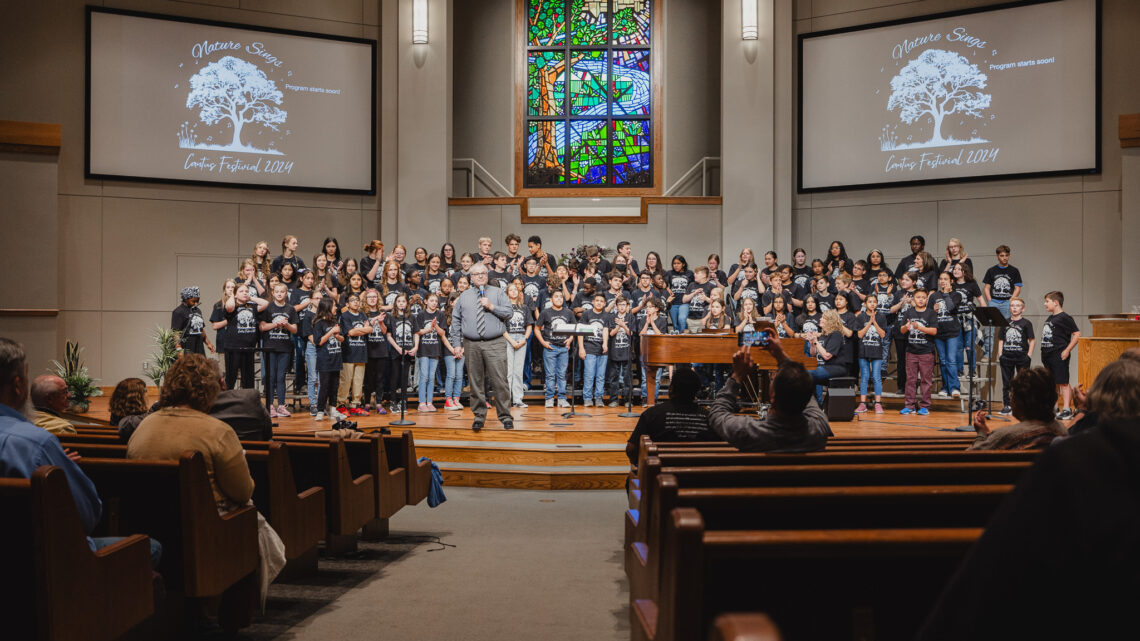
May 24, 2024 澳洲州幸运5查询历史记录,结果核查 Nature’s Melodies Unite Young Voices at Cantus Music Festival
Read more -
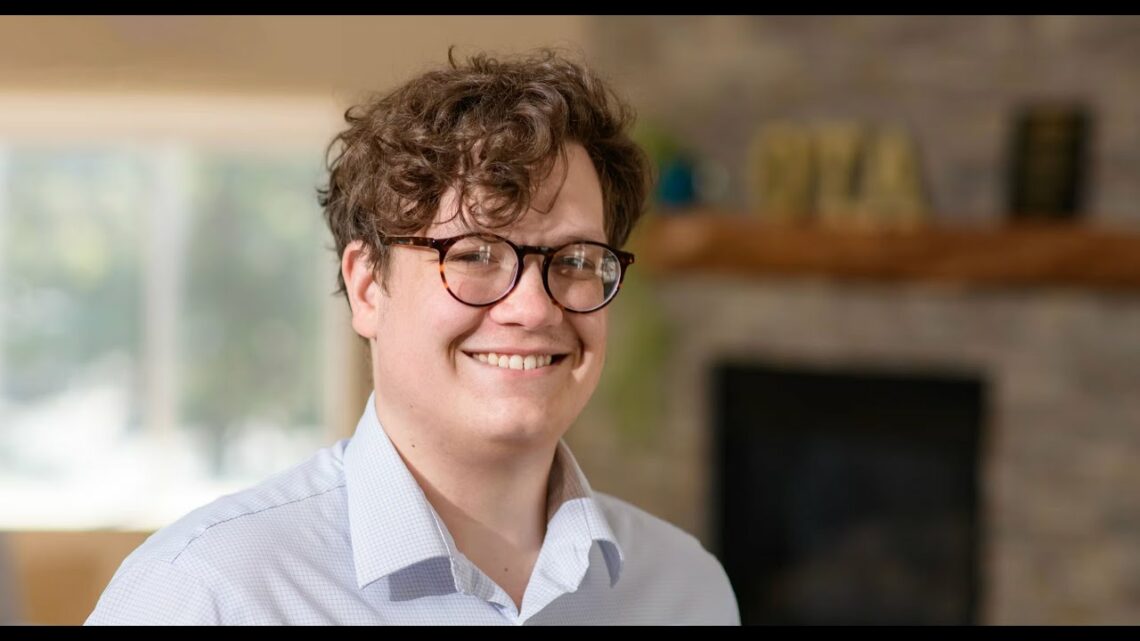
May 23, 2024 Answering the Call to Pastoral Ministry Jacob Pittenger explains how Union College helped him follow his calling.
Read more -
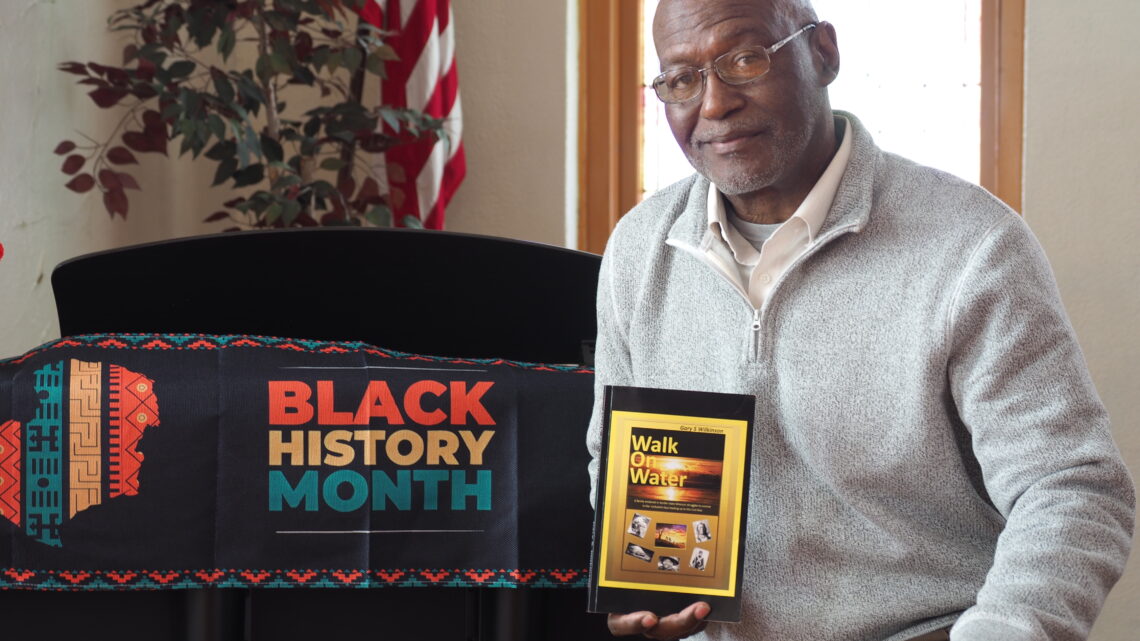
May 23, 2024 CSC Member’s Book to Become Community Production in June
Read more
袋鼠国的幸运5历史资料查询,查找结果 News
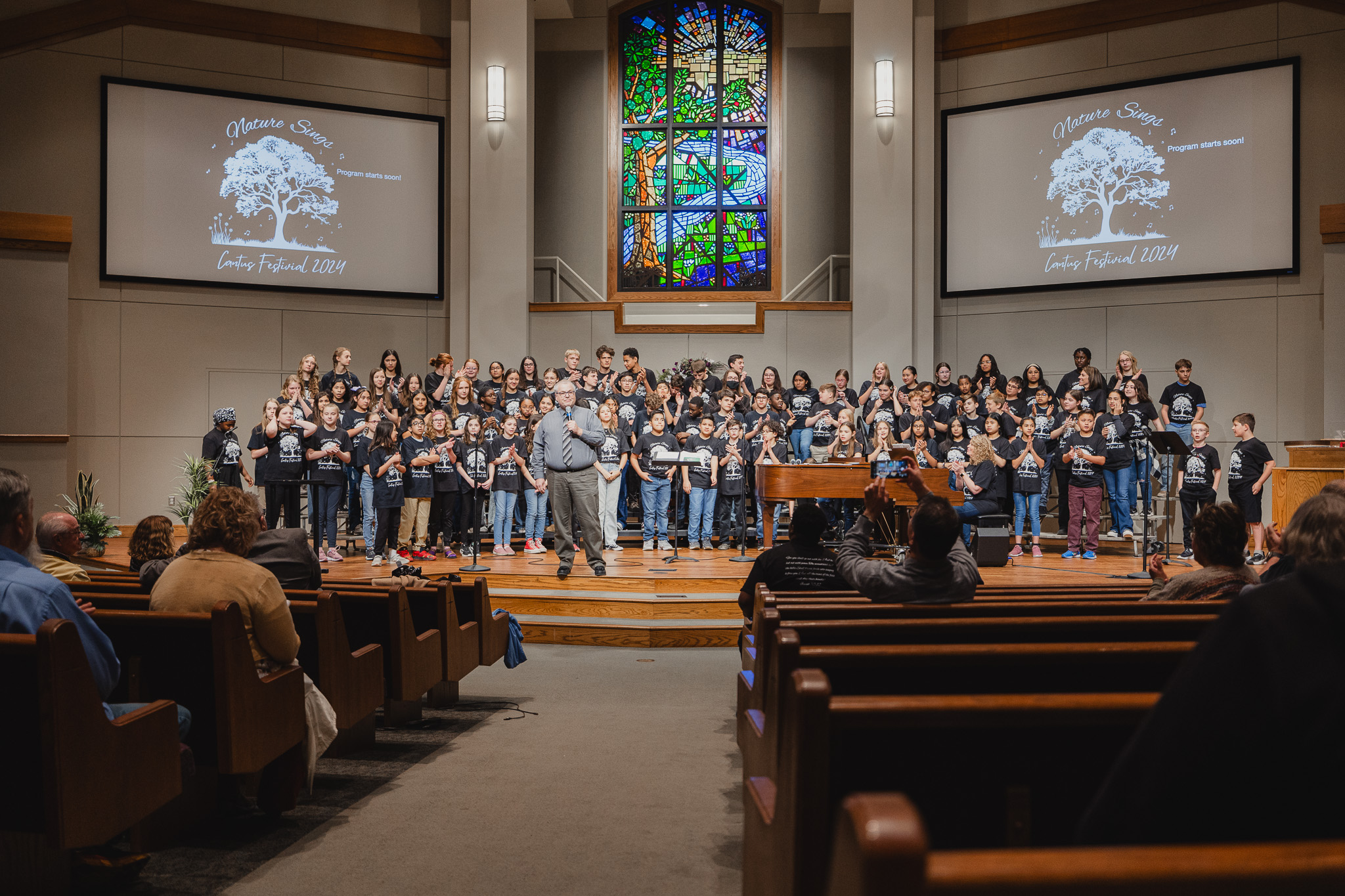 澳洲州幸运5查询历史记录,结果核查 Nature’s Melodies Unite Young Voices at Cantus Music Festival
Saul Dominguez – May 24, 2024
澳洲州幸运5查询历史记录,结果核查 Nature’s Melodies Unite Young Voices at Cantus Music Festival
Saul Dominguez – May 24, 2024
Last March the harmonious sounds of children’s voices filled the air at the annual Cantus Music Festival which brought together nearly 100 students from grades 5-8 in seven schools across the Kansas-Nebraska Conference. Spearheaded by Sarah Gilbert, Midland Academy music teacher, and Renae Cross, College View Academy music teacher, the festival was the culmination of months of careful planning and passion for music. The festival kicked off its planning phase last August when Gilbert and Cross began selecting a diverse array of songs that resonate with the theme “Nature Sings.” By January, they had reached out to several schools, including College View Academy, Midland Adventist Academy, George Stone School, Great Bend School, Wichita Adventist Christian School, Omaha Memorial School, and Topeka Adventist Christian School, inviting them to join this melodious event. Throughout the day, students explored and practiced six captivating songs inspired by the beauty of nature—from the intricacies of animal life to the awe-inspiring phenomena of storms. The theme also touched on spiritual elements, drawing from Psalm 127 to celebrate the sanctity of nature and our place within it. One of the festival’s highlights was witnessing these young musicians, often accustomed to digital interactions, coming together in person. This event not only showcased their vocal talents but also fostered a sense of community among students from different backgrounds. For many, it was a unique opportunity to meet new friends, connect over shared interests, and enjoy the unifying power of music. The Cantus Music Festival proved to be more than just a musical event; it was a celebration of youth, creativity and the bonds that music can forge. As the students stood together for about nine hours throughout the day, their voices merged into a powerful expression of praise to God who created both their voices and all of nature!
Read more...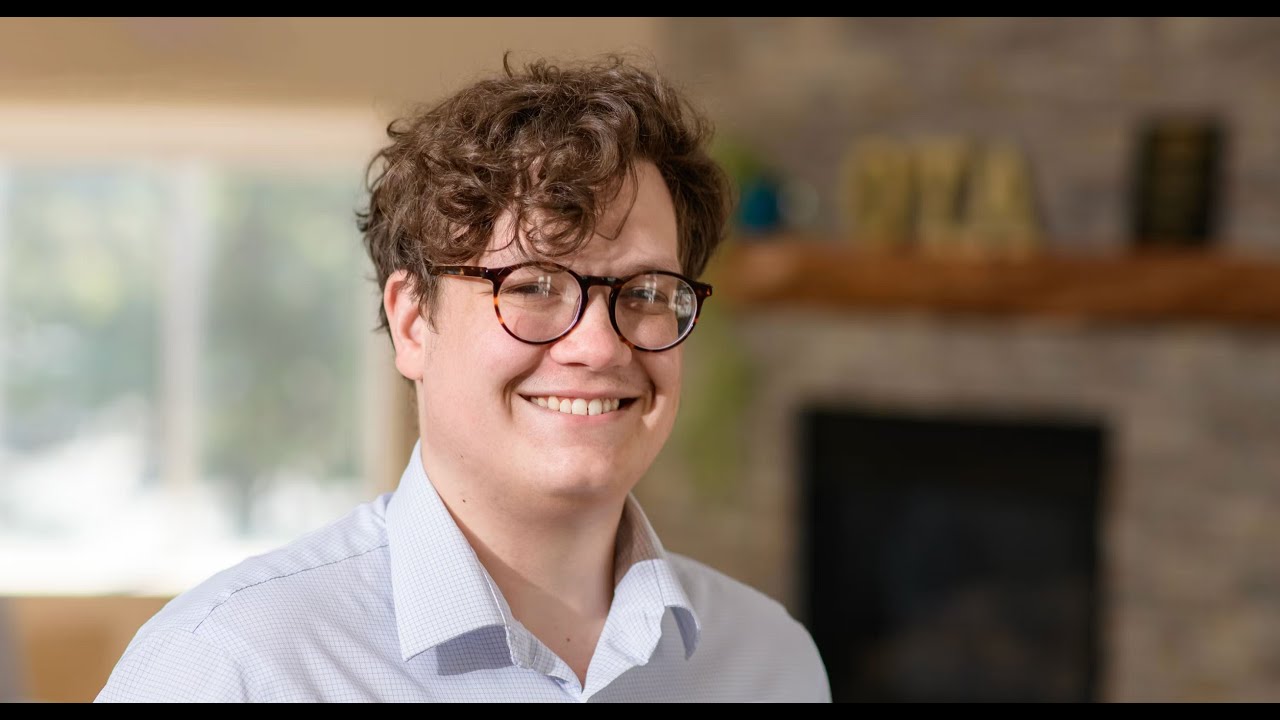 Answering the Call to Pastoral Ministry Jacob Pittenger explains how Union College helped him follow his calling.
Ryan Teller – May 23, 2024
Answering the Call to Pastoral Ministry Jacob Pittenger explains how Union College helped him follow his calling.
Ryan Teller – May 23, 2024
Jacob Pittinger, now serving as a pastor in Bismarck, North Dakota, shares the story of how God led him to full-time pastoral ministry and how Union College helped equip him to be successful. NOTE: I recommend using a QR code for the link to the video: https://youtu.be/qB979YfVdBI?si=1mwLPA4473Sn4L0L
Read more...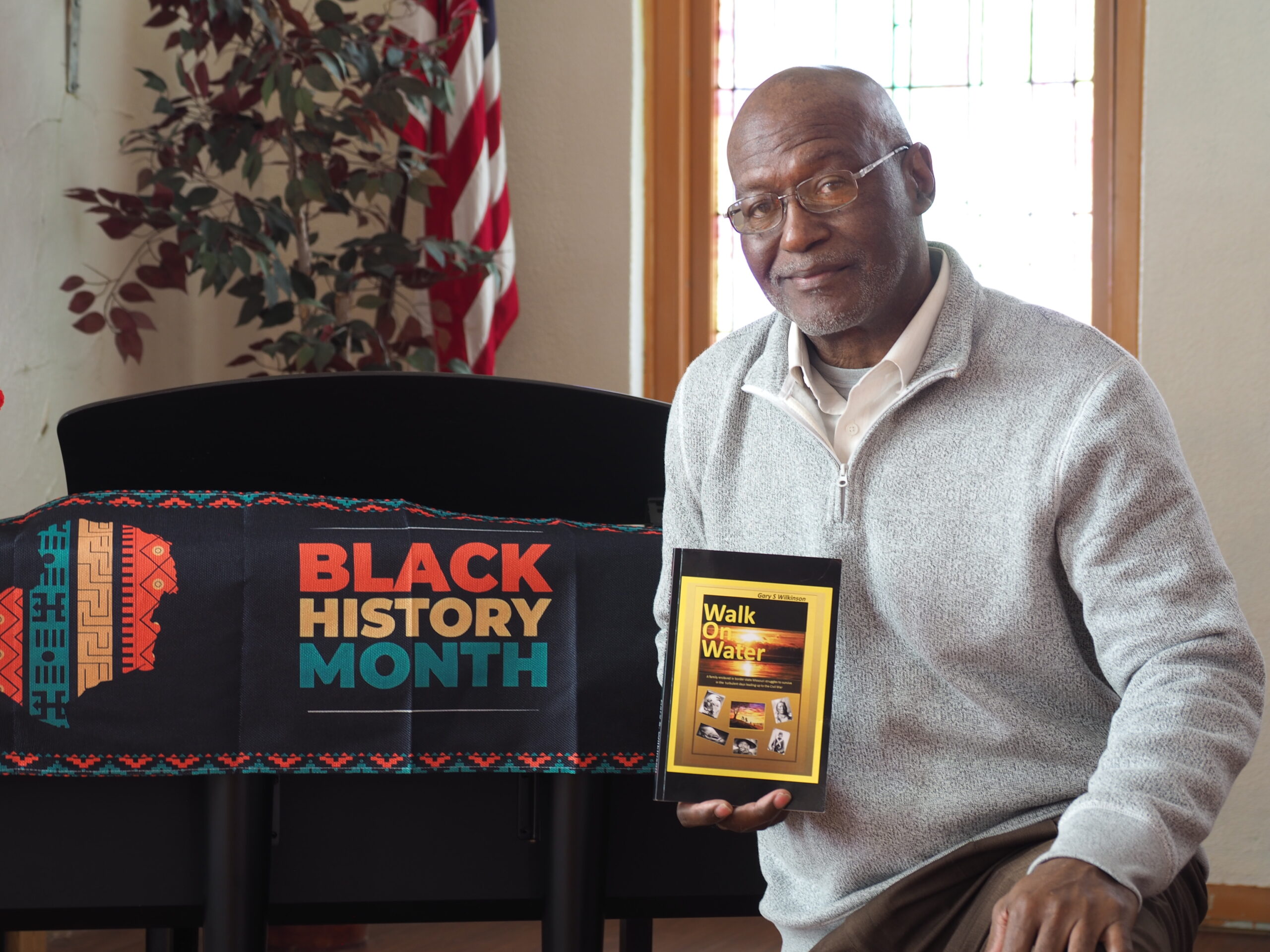 CSC Member’s Book to Become Community Production in June
Guest Contributor – May 23, 2024
CSC Member’s Book to Become Community Production in June
Guest Contributor – May 23, 2024
Gary Wilkinson Sr. is a quiet, “get things done” kind of person who holds a B.S. in Organizational Management and Leadership from Friends University, in Wichita, Kansas. Gary has extensive community involvement in his repertoire of service in the areas where he resides and previously resided. In University City, Missouri, he served as Superintendent of Streets. In Tarkio, Missouri, he served as athletic director for Youth Services International. And in St. Joseph, Missouri, where he presently resides he served as the executive director of East Side Human Resource Center, founded by John Lucas, Jr. Also in St. Joseph, Gary was elected to the City Charter Commission, changing the form of government from Mayor-Council to Council-Manager. For three terms he was elected to City Council serving one term as Deputy Mayor. The community knows him, and also the church he attends as a member. Gary has quietly served his community and his church with distinction and dedication. As a member of the Emmanuel Seventh-day Adventist Church in St. Joseph, he has been a player coach for the men’s basketball team, served as church treasurer and worked with many other church auxiliaries. Presently, he is serving as the head elder. In 2017 Gary Wilkinson Sr. was inducted into the Black Archives Hall of Fame in St.Joseph. Gary’s picture hangs on a wall within the museum along with other family members, notably John Lucas Sr. (known as big John) and John Lucas Jr. The story of his great-grandfather and great-grandmother on his father’s side, Mr. And Mrs. Amos Stillman, is a special feature in the museum. Today, Gary serves as president of the Midtown Initiative Economic/Community Development Organization. In January Gary was also voted to be president of St. Joseph Museums, Inc. being the first African American to receive that designation. Just recently during the Hall of Fame Induction service of two prominent individuals of the city of St. Joseph, a book authored by Gary titled Walk On Water was introduced. The book chronicles events in the lives of the family of Charles and Charlotte Harvey (enslaved great-great grandparents of Gary) leading up to the Civil War. Living in north-central Missouri, their story details the epic struggle to be free, embodying the strength and resilience of the human spirit. There will be a theatrical production of the book at the Missouri Theater, 717 Edmond Street in St. Joseph, on Wednesday, June 19 and Thursday June 20. Several have auditioned for the theatrical performance and two members of the Emmanuel Church will have parts: Elder Donna Brown and Brother Kevin Angandja. Carter Goodwin, who also auditioned for a part, writes: “Coming away from the audition last night I realized that this is the most important show I’ve ever been in. It will be transformative, personally and for the community. There was a spirit of reverence in the room that can’t be faked. It is a piece that illustrates one of the greatest powers of our art — the power to heal broken hearts and spirits.” Gil Webb pastors the Emmanuel Church in St. Joseph, Missouri.
Read more...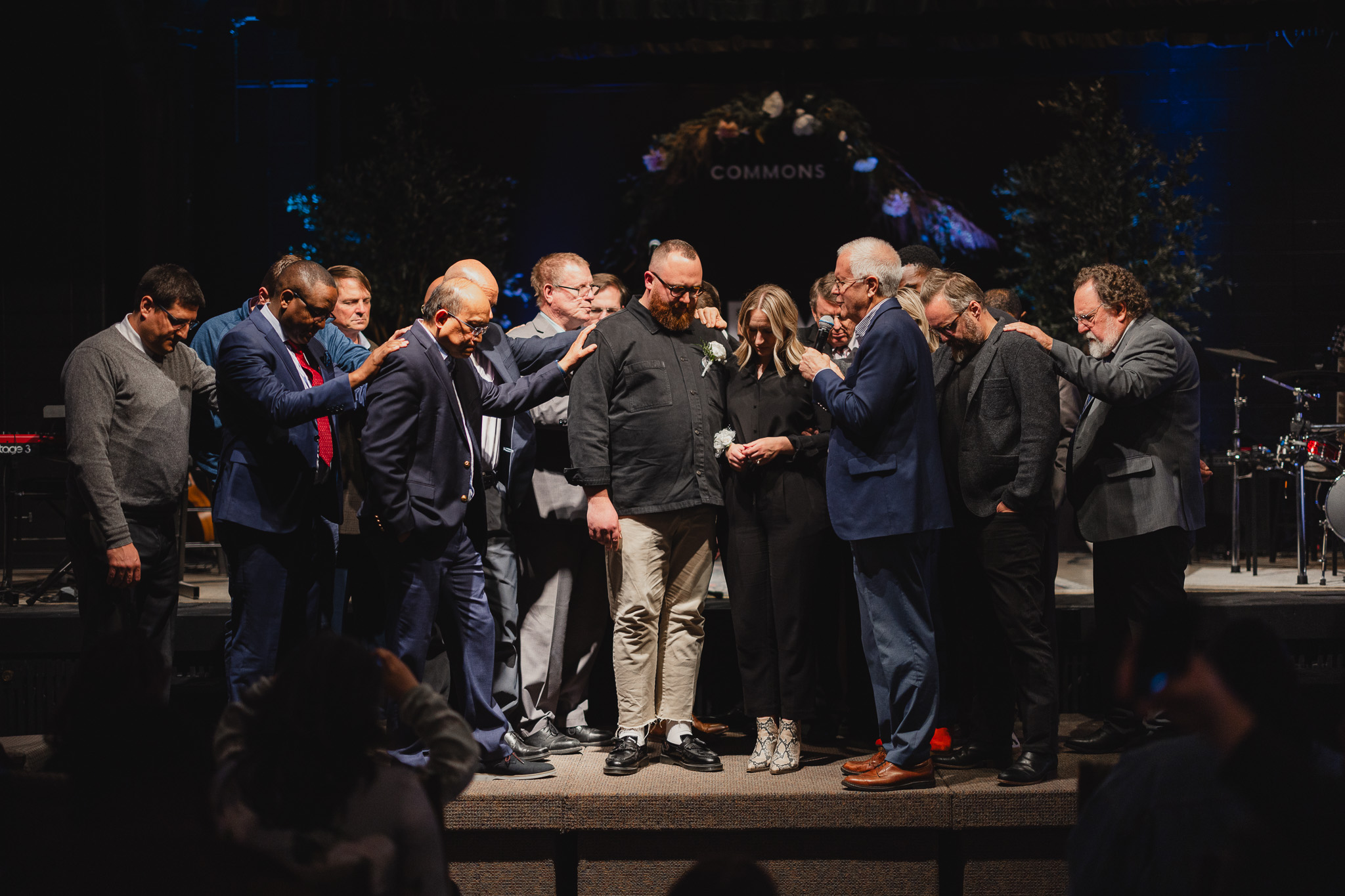 Kyle Smith Ordained at New Haven Commons
Saul Dominguez – May 16, 2024
Kyle Smith Ordained at New Haven Commons
Saul Dominguez – May 16, 2024
On March 23, 2024, New Haven Commons in Overland Park, Kansa, was filled with celebration and solemnity for the ordination of Pastor Kyle and his wife Annie Smith. The event encapsulated a journey of faith and dedication, highlighted by moments of spiritual reflection. Pastor Kyle has touched many through his commitment to ministry, shaped significantly by his upbringing in St. Louis by his mother, Tricia. His response to the call of service has been shaped by years of academic and practical preparation, culminating in his ordination. The ordination was marked by three significant moments: the message by Japhet De Oliveira, the ordination prayer by Ron Carlson, and the charge by Virgil Covel. De Oliveira’s message, “And He had to Pass Through Samaria,” provided a profound biblical reflection that set the tone for the spiritual responsibilities Pastor Kyle is embracing. Following this, all pastors in attendance were invited to come forward and place their hands over Kyle and Annie for the ordination prayer, which was led by conference president Ron Carlson. The ordination ceremony not only affirmed Pastor Kyle’s role within the church but also celebrated the path he has walked so far. As the congregation joined in song and later gathered in the Commons lounge for a reception, there was a sense of joy and celebration for Kyle and Annie Smith’s ministry thus far.
Read more...
Blogs
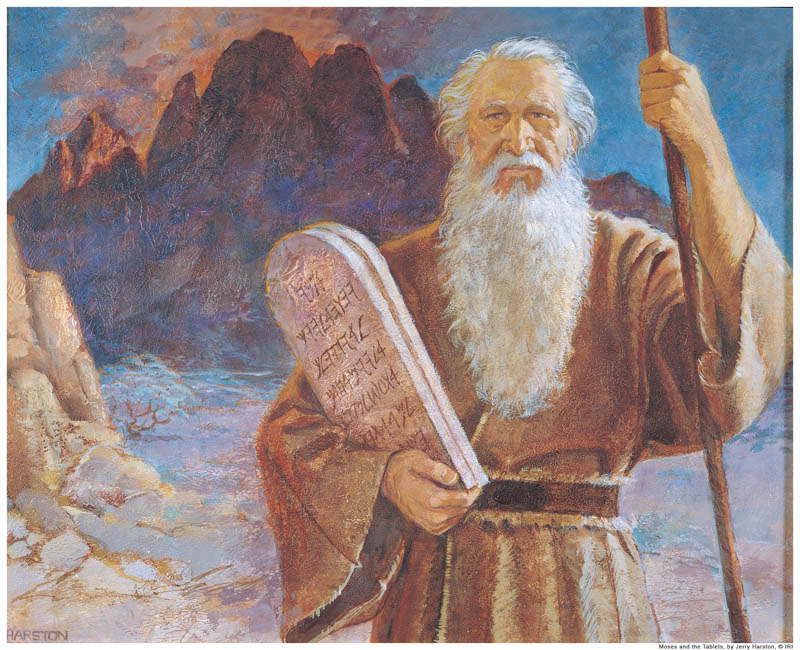 The Teacher’s Notes–The Foundation of God’s Government, Lesson 9 Adult Bible Study Guide, 2024 2Q, "The Great Controversy"
The Teacher's Notes – May 25, 2024
The Teacher’s Notes–The Foundation of God’s Government, Lesson 9 Adult Bible Study Guide, 2024 2Q, "The Great Controversy"
The Teacher's Notes – May 25, 2024
Sabbath School Lesson for May 25-31, 2024 Overview of Lesson 9, The Foundation of God’s Government Memory Text: “And the dragon was enraged with the woman, and he went to make war with the rest of her offspring, who keep the commandments of God and have the testimony of Jesus Christ.” Revelation 12:17 NKJV Woman is a symbol we find in the Bible for the church–either a pure church that loves the truth, or an apostate (fallen) church that has rejected God’s truth (such as the one called Babylon). In the description we find in Revelation 12:17, our memory text, we can definitely know it’s talking about a pure church that has angered the dragon (also known as Satan–Revelation 12:9) In Revelation 14:12, we find the same identifying description of the saints of God. We associate saints with holy people, those who are trying to be holy, like the God they worship. This is done by keeping His commandments (obviously the Ten Commandments of the Old Testament) and the testimony or faith of Jesus (found in the New Testament, through the life of God’s own Son, the Messiah). If we are to enjoy the peace and security of God’s Kingdom, we must prepare ourselves by keeping His commandments through faith in the blood of Jesus. This will allow His saints to reflect God’s character of justice and mercy to the world. We can easily see a connection between the heavenly sanctuary, God’s law which is found and protected there (Revelation 11:19), and the Sabbath which is in the center of that law. After all, who we worship, the Creator or the deceiver, is the key issue in the great controversy between Christ and Satan. This week, we will explore: Sunday: The Sanctuary and the Law–the ark of the covenant (which contains the law) is in the heavenly sanctuary (Revelation 11:19) Monday: The Immutability of God’s Law–the law of God does not change (Matthew 5:18) Tuesday: The Sabbath and the Law–the Sabbath is in the center of God’s law (Exodus 20:8-11) Wednesday: The Mark of the Beast–the mark of the beast shows we worship Satan, the dragon (Revelation 13:4) Thursday: The Three Angels’ Messages–the first of the three angels’ messages tells us to worship the Creator (Revelation 14:6-7) Sunday: The Sanctuary and the Law A study of the earthly sanctuary tells us much about what John saw and wrote about in Revelation. We know from Leviticus, for example, that the Most Holy Place was entered only once a year by the High Priest on the Day of Atonement, when the sanctuary was cleansed. Inside this holy room was the ark of the covenant, which contained the Ten Commandment Law, written on stone tablets and given to Moses (Hebrews 9:4). We are all judged by these ten, eternal principles even today. God’s Law is the essence of who He is–a perfect, balanced blend of His love and justice, which we know never changes (Malachi 3:6). Besides the justice that God’s Law guarantees us on Judgment Day, it is through His mercy that we are even given the Ten Commandments, which mark the way of escape from our sorry, sinful selves. Not surprisingly, the top cover of the ark is called the mercy seat (Exodus 25:21, 22). What a comfort it is to see God’s ark, containing the Law, in John’s vision of the heavenly sanctuary (Revelation 11:19). To be sure, God is found in His sanctuary and is seen in His Law. Bible Verses: Revelation 11:19, Exodus 25:16, and 31:18 What is the significance of the law being stored in the earthly sanctuary and also being seen in vision in the heavenly sanctuary? Revelation 1217 and 14:12 What do you think it means by the testimony or the faith of Jesus? Why are the two words used interchangeably? Monday: The Immutability of God’s Law The commandments that the saints are said to have kept, or obeyed, are the same ones John saw in vision. Written by God’s own finger, the Ten Commandments stand as a testimony of who God is and what we can do to be more like Him. Jesus upheld the Ten Commandments often, by quoting them, preaching them, and most of all, by living them. They were seen as a transcript of His character. He clarified that He would never destroy or minimize what God desired from His children in those Commandments (Matthew 5:17, 18). Some of the Protestant Reformers, such as John Wesley, also upheld God’s moral Ten Commandment Law, while correctly recognizing the temporary nature of the ceremonial, ritual laws that pointed forward to the first coming of the Messiah, the ones that had been fulfilled. Those, as the Bible tells us, have been done away with. But the unchangeable, immutable, moral Law, found in the Ten Commandments, will be forever binding upon God’s faithful people. God’s Ten Commandments stand fast forever and ever (Psalm 111:8), and, best of all, are not burdensome (1 John 5:3). If we love God, we, too, will keep them (John 14:15). Bible Verses: Matthew 5:17, 18, Ecclesiastes 12:13, 14, and Psalm 111:7, 8 Why do you think God’s Law will always need to be obeyed? 1 John 5:3 and John 14, 15 If God’s Law seems like it’s painful to keep, what might be the problem with our obedience? And what can we do about it? Tuesday: The Sabbath and the Law There are many reasons God’s Sabbath is found in the center of the Ten Commandments. The fourth Commandment reminds us of God’s creatorship in the Garden of Eden, but also points forward to the time in the future when we will once again enjoy a new earth in all its original beauty. At the same time, we are reminded of our Redeemer. Sabbath rest includes rest from our works, and relying on His grace to save us. The Sabbath is central to our worship of the Creator and Redeemer. It’s a sign of our loyalty to the true God. Satan The Teacher’s Notes–The Foundation of God’s Government, Lesson 9 Adult Bible Study Guide, 2024 2Q, “The Great Controversy”“>Read more…
Read more... #TuesdayTalk: 澳洲五历史资料查询,查找结果 THIS WORLD IS NOT MY HOME? Accepting the Truth and Living in It
Home, Church, School – May 21, 2024
#TuesdayTalk: 澳洲五历史资料查询,查找结果 THIS WORLD IS NOT MY HOME? Accepting the Truth and Living in It
Home, Church, School – May 21, 2024
This world is not my home I’m just a-passing throughMy treasures are laid up somewhere beyond the blueThe angels beckon me from heaven’s open doorAnd I can’t feel at home in this world anymore I love music like the next person, and I love this song. Albert E. Brumley wrote many of my favorite old hymns. They’re hymns my family has sung together in the living room and church for as long as I can remember. However, certain phrases in this song have struck a chord with me lately that I think are worth discussing. Christians, for centuries–even since Christ ascended to Heaven–have looked forward to something greater than this world. They have waited and watched for Christ’s return when He has promised to call us up from this earth and take us into the clouds to Heaven. We, as Christians, Seventh-day Adventists, and as people are so focused on what we call the Second Coming, that we seem to overlook, even forget, the First Coming–not when Jesus came as a baby to live as Mary and Joseph’s son on Earth, but when He came with His Father, the Holiest of Holies, to create this place for us. Made for Us Genesis 2:19 says, “Now out of the ground the Lord God had formed every beast of the field and every bird of the heavens and brought them to the man to see what he would call them. And whatever the man called every living creature, that was its name” (ESV). It’s difficult to see creation as anything other than the work of a loving Master, so I don’t understand why we humans would love to pass through life on earth as fast as possible for heaven. What’s wrong with the earth? God saw it fit for us… Made of Power, Wisdom, and Understanding Jeremiah 10:12 says “It is he who made the earth by his power, who established the world by his wisdom, and by his understanding stretched out the heavens” (ESV). Not only was the earth created through the creative voice of a loving Father, but scripture tells us it was made by His power, wisdom, and understanding. Think about it. The God of the universe, all-knowing, all-powerful, and Holiest of Holies, created something for us, and through His Holiness, and all we can do is bide our time for something better. Most of the time, it feels like we also neglect our time here, knowing something better is coming. We neglect the earth and our time on it. The Kingdom of God Where does scripture say is the Kingdom of God? Is it a place that is to come? Is it in Heaven? Is it in the future only? My interpretation of many New Testament scriptures is that the Kingdom of God is among God’s people, where the Holy Spirit lives in their hearts and connects them together and with the Father. What’s more–the Kingdom of God, physically, will be on earth–not Heaven! Jesus will rule it and make it His home. By studying the Millennium, we learn that we’ll spend only a thousand years in Heaven. In the grand scheme of human history, a thousand years is a blip–a fraction of the time we’ll spend on earth. This World Is My Home! This world is my home. It’s yours too. God created a beautiful planet for us. It is evolutionary, it is scientific. It regenerates in a thousand–a million different ways. It was spoken into existence by the voice of the One True God. He spoke and waters flowed. He spoke and light burst to life. He spoke and animals breathed. This earth that we inhabit was created to last forever and God will make sure of it…for us. Enjoy it now. Bloom where you’re planted. This world is your home.
Read more... #SabbathSlowdown: Remembering the Sabbath This Summer 5 Tips for Unforgettable Sabbaths this Summer
Home, Church, School – May 18, 2024
#SabbathSlowdown: Remembering the Sabbath This Summer 5 Tips for Unforgettable Sabbaths this Summer
Home, Church, School – May 18, 2024
As the days stretch before us on these long, hot summers, there is an inevitable temptation to stay indoors–it’s where the air conditioning is! In some places where summers are short and days are long, excursions or travel became Sabbath rituals to replace church attendance for these long, hot summer Sabbaths. Even when summer activities damper your church attendance, you can make your Sabbaths special and unforgettable with these 5 tips. 1. Disconnect with Tech and Connect with… everything else! Instead of picking up your smartphone and scrolling social media yet again, check in with those around you! When you say no to technology, you say “yes!” to so many other things. Spend time connecting with friends, family, and neighbors. Take a walk outside and connect with nature. Attend church and connect with your religious tradition. 2. Break Bread with Others Even if you find yourself taking a day trip on the weekend instead of attending church or spending time with your local community, you can invite others along on your adventures. You can invite someone to your home for a meal, or you can invite someone along for a picnic if you aim to spend your time camping or spending time at a state park. You don’t have to do something fancy–but can even ask your friends and families to bring something small to share! Grab a cooler and fill it up! 3. Worship Together and Alone Keep worship in your summer routine, but don’t feel pressured to do everything a certain way. Plan an outdoor church service with your local church. Practice communion in the forest and wash feet in a stream. Take time to worship on your own as well, early in the morning, as the sun comes up in the early morning warmth. Take advantage of the longer days to enjoy various forms of worship during the Sabbath hours: hiking, serving your community, gardening, camping, and more. 4. Share Popsicles in the Park Take your Sabbath School class on an excursion to a community park to share cool drinks or popsicles with strangers. This doesn’t have to be an evangelistic tool at all, but just something kind and fun to do. If you’d like to add an element of worship, invite friends who can sing and play instruments, and make an impromptu outdoor ‘singing’ out of it. 5. Pick Up a Book Instead of turning the TV on and flipping through channels or planning a family movie night, pick up a book. Take it outside and read around a firepit or turn on your fireplace in the house (even though it’s warm) and enjoy a book together with the family. Make this a monthly tradition and invite friends. Make popcorn and make smoothies or prepare a hot fudge sundae bar. There are many things you can do to keep Sabbath special during the long days of summer, but they don’t have to be complicated. In the same way, you can do small things to make Christmas special even among the commercialism of the season, you can do small things to make the Sabbaths special for the family during the summer. Include your church. Include your family, friends, and neighbors, or just make it special for yourself. Leave comments on Facebook with your ideas for keeping the Sabbath special this summer.
Read more... The Teacher’s Notes–Light From the Sanctuary, Lesson 8 Adult Bible Study Guide, 2024 2Q, "The Great Controversy"
The Teacher's Notes – May 18, 2024
The Teacher’s Notes–Light From the Sanctuary, Lesson 8 Adult Bible Study Guide, 2024 2Q, "The Great Controversy"
The Teacher's Notes – May 18, 2024
Sabbath School Lesson for May 18-24, 2024 Overview of Lesson 8, Light From the Sanctuary Memory Text: “We have such a High Priest, who is seated at the right hand of the throne of the Majesty in the heavens, a Minister of the sanctuary and of the true tabernacle which the Lord erected, and not man.” Hebrews 8:1, 2 NKJV William Miller’s spotlight on the Second Coming came from Daniel 8:14, which talked about the cleansing of the sanctuary. He failed, however, to understand that the sanctuary to be cleansed was, by that time, only in heaven. A study of the earthly and the heavenly sanctuary enabled some of those who lived through the Great Disappointment in 1844 to see that a judgment had indeed started at that time, but it would happen in God’s heavenly sanctuary. This “cleansing of the sanctuary” would come to be known as the pre-Advent judgment. This would be a time when we are to prepare our hearts for His return, and for God to determine who is or is not saved. After all, He comes with His rewards (Revelation 22:12). The 2,300-day prophecy ended in 1844 and marked the beginning of the time of the end. The first angel’s message was then heard, which instructs us to “Fear God and give glory to Him, for the hour of His judgment is come” (Revelation 14:7). God’s mercy and transparent justice is once again evident in this warning to get ready. He’s coming soon! Read chapters 22-24 and 28 of The Great Controversy to learn more about the sanctuary topic. We will learn about… Sunday: The Heavenly Sanctuary–This must be the one prophesied in Daniel, because the earthly sanctuary services had ended by 1844. Monday: In the Holy of Holies–Christ is now ministering for us in the Most Holy Place, represented by the Day of Atonement. Tuesday: The Judgment Has Come–This is the message of judgment given by the first angel in Revelation 14:6, 7. Wednesday: The Good News of the Most Holy Place–The good news/gospel is that Jesus provides an escape from sin through His blood shed at Calvary. Thursday: Jesus, Our Advocate in the Judgment–We can come boldly before the throne of our heavenly High Priest. Sunday: The Heavenly Sanctuary There are two sanctuaries mentioned in the Bible. One was built by Moses and the Hebrews, spoken of in the Old Testament. This earthly sanctuary or tabernacle that Moses was told to build was a shadow or copy of the one in heaven (Hebrews 8:5). It illustrated the plan of salvation which had been lost sight of during their long period of slavery in Egypt (Psalm 77:13). The “true tabernacle”, the one in heaven, also points to Jesus’ sacrificial ministry. Some of those disappointed Adventists, who were wanting to understand more about the Second Coming and why William Miller’s prediction didn’t come true, were eventually drawn to this idea of a heavenly sanctuary found in the New Testament book of Hebrews. It seemed like the logical place to focus their attention and study. There is always hope for our salvation. when we look at Jesus’ sacrifice and priestly ministry still going on in the heavenly sanctuary today. Bible Verses: Exodus 25:8, 9 and Hebrews 8:1-6 Why is it important to study both the earthly and the heavenly sanctuary? Psalm 77:12-15 What can we learn about Jesus from studying the sanctuary? Monday: In the Holy of Holies The cleansing of the sanctuary happened on the Day of Atonement, also called the Day of Judgment, or Yom Kippur in Hebrew. It was the only time during the year when the high priest entered the Most Holy Place where the ark of the covenant was kept. The end purpose of this priestly activity was to cleanse the sanctuary by symbolically placing the blood collected there during the daily sacrifices onto the head of a scapegoat they called Azazel and sending it into the wilderness to die alone (Leviticus 16:21). This represented how God will someday place on Satan the guilt and responsibility for deceiving so many, both in heaven and on earth. Before this Day of Atonement came, however, the Israelites spent ten days fasting and praying to prepare their hearts for the solemn event. They were to stop clinging to cherished sins and turn away from all evil. This soul searching must also happen now before the great Day of Judgment. God’s people must ask for repentance and cleansing in these last days, so they will be ready for Christ’s glorious Second Coming. Bible Verses: Leviticus 16:21, 29-34, and 23:26-32 Why was this yearly preparation needed for the people of Israel, and how was it to be carried out? Hebrews 9:23-28 How was Christ’s priestly ministry different from the earthly sanctuary priests? Tuesday: The Judgment Has Come The two main characteristics of God are His mercy and justice. One is just as prevalent in the Bible as the other. We hear much about His loving forgiveness, but God’s judgment is also mentioned often in Scripture. For example… “For God will bring every work into judgment” Ecclesiastes 12:14 “every idle word that men may speak, they will give account of it in the day of judgment” Matthew 12:36 “The hour of His judgment has come” Revelation 14:7 Revelation 22:10-12 informs us that at some point, God’s probation for mankind will be closed. When Christ comes again in the clouds, He will have His rewards with Him (Revelation 22:12). All judgments about who will be saved or lost will have been determined shortly before the Second Coming. The parable of the ten virgins (Matthew 25:1-13) also supports the idea of probation closing at some point…the “door was shut”. The idea of a pre-Advent judgment going on in the courts of heaven makes sense. God is allowing the angelic hosts there to oversee the process of judgment. The books of life are opened in order for them to be convinced of the openness and fairness of His decisions. Bible Verses: Daniel 7:9, 10 The Teacher’s Notes–Light From the Sanctuary, Lesson 8 Adult Bible Study Guide, 2024 2Q, “The Great Controversy”“>Read more…
Read more...
奥5历史数据查询,结果检索、计划直播 STORIES
 Removing Our Boundaries Before Our Saviour A short devotional thought by Pastor Sasha Bolotnikov
Guest Contributor – May 23, 2024
Removing Our Boundaries Before Our Saviour A short devotional thought by Pastor Sasha Bolotnikov
Guest Contributor – May 23, 2024
Since my childhood I dreamed about learning to interact with dolphins. I knew that they were among the smartest animals on the planet. Finally, a few years ago such an opportunity arose. My wife and I got tickets to the dolphin encounter in Hawaii. The trainer who led this tour made the dolphin swim toward him on his back with his belly up. He told us that this is how dolphins come to trainers for medical checkups so that trainers would be able to draw blood samples and conduct other research. However, while dolphins are indeed very intelligent animals, I don’t think they get the concept of what a medical checkup really is. Instead, it takes a trainer multiple weeks of day and night interacting with a dolphin before an animal could start trusting its trainer enough to willingly let him draw the blood samples. In Psalm 139 David begins by saying: “You have searched me, LORD, and you know me” (vs. 1, NIV). In the original Hebrew the verb ‘search’ (KHaQaR) occurs 38 times throughout the Old Testament appearing for the first time in Deut. 13:15 where the command is given to conduct thorough investigation of a crime. In the Modern Hebrew, Israelis use this verb in reference to scientific research. Speaking the modern language, we could say today that David begins his psalm by acknowledging to be God’s research subject. And since God is the perfect ‘researcher,’ He knows everything about David and possesses knowledge not only about his sitting down and getting up, but also about his utmost intimate thoughts. Typically, to express the concept of thoughts, Hebrew would use the noun ‘makhshav’, which occurs quite frequently in the Old Testament. However here in vs.2 of Psalm 139 David uses the noun ‘reah’ which is a very rare ancient Hebrew word similar to the word ‘friend.’ Our Creator has wonderfully designed people to be free thinking beings capable of making decisions, having emotions and being able to dream. Our thoughts comprise what we are: our personality and our character originates from our ways of thinking. Sometimes our thoughts can be understood by other people through our gestures, demeanor or facial expressions. And at times we even wish that other people would understand what we are thinking. But there are some thoughts we keep close to ourselves and do not want them to be known by others. Such thoughts are called ‘friends’ in Hebrew and they comprise our intimate inner world. There are only selected people whom we allow to know and be a part of our personal inner world. This all depends on how we choose to build our boundaries. The book of Gen. 2:24-25 teaches us about the ideal marriage experience “That is why a man leaves his father and mother and is united to his wife, and they become one flesh. Adam and his wife were both naked, and they felt no shame.” The last words of this passage indicate the level of trust the first couple had between each other. This means that between the first spouses there were very few barriers. One of the greatest attributes of a true loving marital relationship is the removal of boundaries and mutual trust. On the other hand, if a stranger breaks your privacy, this can feel terrifying and cause extreme trauma. However, God, who really knows everything about us is not a stranger. He is closer to us than our parents or our spouse because He has such intimate knowledge of us beyond our understanding! But unlike a stranger who can use that kind of knowledge to bring us harm, our God, Creator and Redeemer desires only the best for us. This is why David writes: “You hem me in behind and before, and you lay your hand upon me. Such knowledge is too wonderful for me, too lofty for me to attain” (Ps. 139:5-6, NIV). For David, divine knowledge of his intimate world was a benefit rather than a detriment. God uses His knowledge of us to guide us on our paths as long as we are willing to drop our boundaries before Him and let Him into our intimate inner world. We can absolutely trust our Lord in everything because our Creator will never hurt us. What a wonderful God we serve! Pastor Sasha Bolotnikov is currently the pastor of The Edge Christian Worship Center and Pathways Fellowship in the Minnesota Conference.
Read more...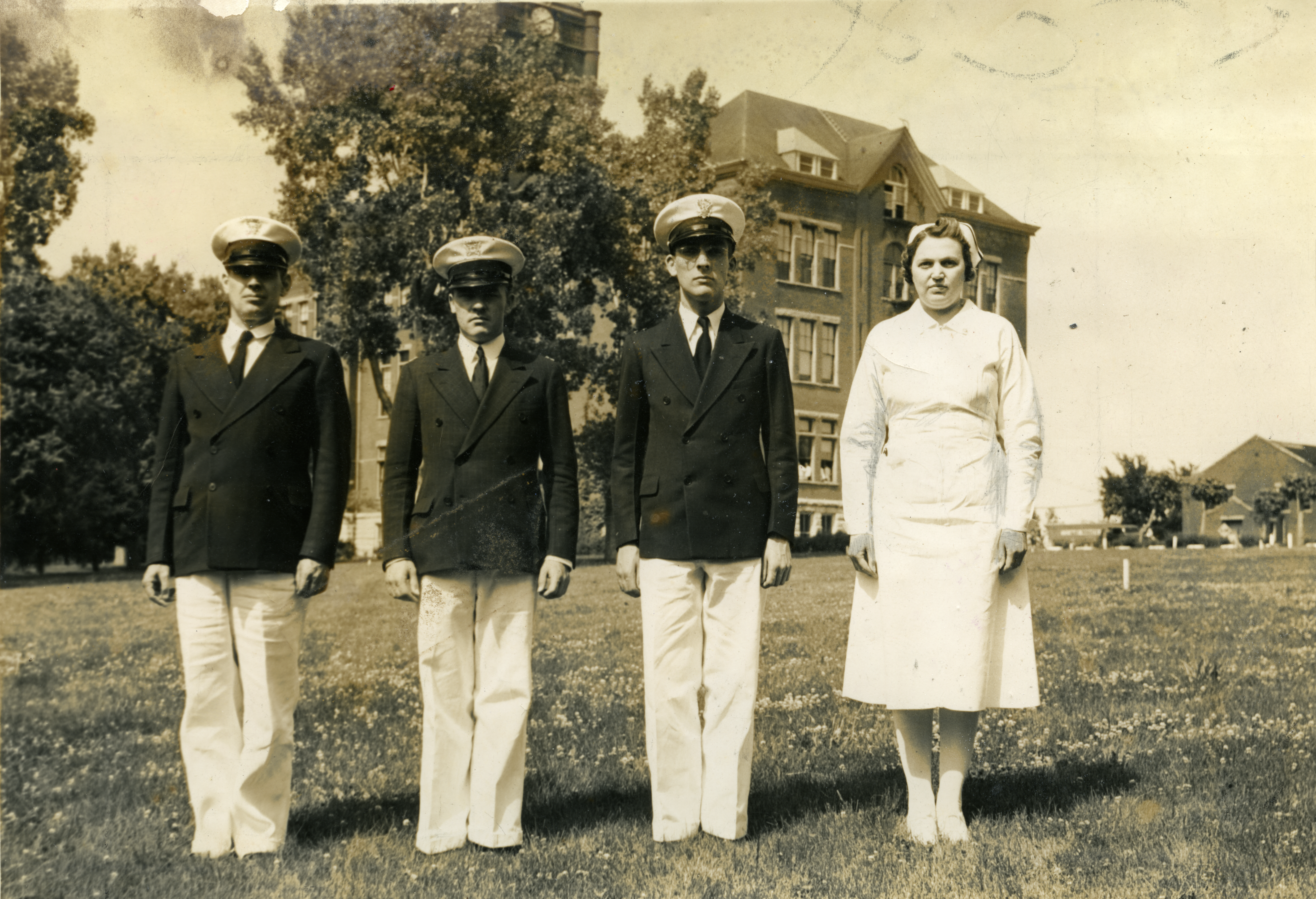 Josephine Rose Steinkraus Stone A Hidden Figure in the Story of the Seventh-day Adventist Medical Cadet Corps Part 3
Adventist Historical Footprints – May 5, 2024
Josephine Rose Steinkraus Stone A Hidden Figure in the Story of the Seventh-day Adventist Medical Cadet Corps Part 3
Adventist Historical Footprints – May 5, 2024
In October 2023, I had the pleasure of presenting a paper at the North American Division’s Women in Adventist History Conference. My paper, “The Invisible Seventh-day Adventist Medical Cadet Corps: Women in a Man’s World,” briefly explored the lives of four women who at one time or another were involved in the Medical Cadet Corps between 1938 and 1958. Limited to only twenty minutes in which to speak, my research retrieved far more material than I had time to share then. Thus, it is my privilege in this article, and in others in this series, to more fully explore the lives and contributions of these four women in addition to two more women who should have been included in the original presentation. Part 1 explored the life of Verna Lucille Robson and Part 2 introduced Kathryn Luella Jenson Nelson. It is my privilege to share part 3 below. Between 1934 and 1938 a number of Adventist colleges in the United States experimented with Medical Corps or Medical Cadet Corps training for their young men who might be subjected to military conscription in the near future. These were low-budget classes, and the teachers either volunteered their time or had it added to their existing workload. In October 1939, the General Conference adopted the program as the Seventh-day Adventist Medical Cadet Corps (MCC). While the General Conference voted a set of twelve recommendations to organize the training across the nation, not one of the recommendations addressed finances. Thus, MCC commanders were left to recruit whatever local expertise they could find, often on a volunteer basis. Very little is known about Josephine Stone, RN, but this single photograph suggests that she was among the staff for the combined Central Union MCC Camp held on the campus of Union College from June 3 to 23, 1940. Josephine Rose Steinkraus was born on January 6, 1911, in Albion, Michigan. Her parents, Charles E. and Bertha (Wilke) Steinkraus, were both the children of German immigrants. The family joined the Adventist church in Michigan around 1895, thus, Steinkraus was raised in an Adventist home. Steinkraus attended Cedar Lake Academy from which she graduated in 1929. She then moved to Wabash, Indiana, where she enrolled in the nursing program at the Wabash Valley Sanitarium and Hospital. Whether her training at this time reached the level of registered nurse, or she furthered her education later is unknown. While training as a nurse at Wabash Valley Sanitarium in Indiana, she became friends with Cecelia Stone, who introduced Josephine to her brother, George Preston Stone, a school teacher. George and Josephine were married on September 1, 1935. At the time of their marriage, George was an elementary school teacher. After George completed his bachelor’s degree at Emmanuel Missionary College in 1937, in the autumn of 1938 the couple moved to Union College in Lincoln, Nebraska, where George continued to teach elementary school. Josephine took a nursing position at Lincoln General Hospital. It was also in Lincoln that the Stones became close friends with Everett and Opal Dick. In 1940-1941, George was second in command of the MCC at Union College, often taking over leadership as Dick was more frequently called away to help organize the MCC in other places in the United States. Between their friendship with Everett Dick, and George’s own leadership role, Josephine was apparently called upon to assist with medical instruction for the Central Union Camp in the summer of 1940. However, her contribution went undocumented apart from this single photograph. It is unknown whether or not she was paid anything for her time and expertise. In 1940, Everett Dick was director of MCC training for the central part of the United States, encompassing what is now the Mid-America, Lake Union, and Southwestern union conferences. Seventy-three young men from fifteen states attended the three-week camp either in part or in its entirety. According to Dick, who served as camp commander, “the program [was] run as nearly like a military camp as possible, with every appointment announced by bugle call, inspection of living quarters, guard duty, military salutes on the proper occasion, and even a few court martial cases,” which were “necessary to ensure the proper discipline and to teach the vital principles of obedience and cooperation.” While the training they received was intended to prepare them for military service, Dick was carefully pointed out that it was also practical in civilian life. “Only one fourth of the time [was] given to drill. A second quarter [was] given to first aid, another quarter to emergency nursing, and another quarter to the organization of the army and the principles underlying army duties” (Dick, “Union College Medical Corps Camp”). In his report, Dick did not indicate who taught each segment of the training, but from other events, we can surmise that his assistants, Orason Brinker and Walter Howe, led the drills. Dick himself may have lectured on army organization and duties. A certified Red Cross instructor would have taught first aid. As a registered nurse, Josephine Stone would have taught emergency nursing. As the manpower demands of World War II increased the upper age-limits of the draft, church leaders decided to move George Stone into conference leadership where he could be exempted as a minister. Thus, in 1942, the Stones moved to the Atlantic Union Conference, where George served as Education and Missionary Volunteer Secretary, and promoted the MCC. It is not entirely clear what Josephine did, although she was home with her children for some years. Their children were born in Massachusetts, a baby girl who died in 1943, Allan Preston in 1945, and Suzanne Kay in 1948. Just after Suzanne’s birth, the family relocated to Maplewood Academy in Hutchinson, Minnesota. In the following years, Josephine moved with her husband to Iowa before returning to Union College, where he finished his career as a professor of education. While it is difficult to track her employment history, Josephine was consistently identified as a nurse, registered nurse, or a retired nurse until Josephine Rose Steinkraus Stone A Hidden Figure in the Story of the Seventh-day Adventist Medical Cadet Corps Part 3“>Read more…
Read more...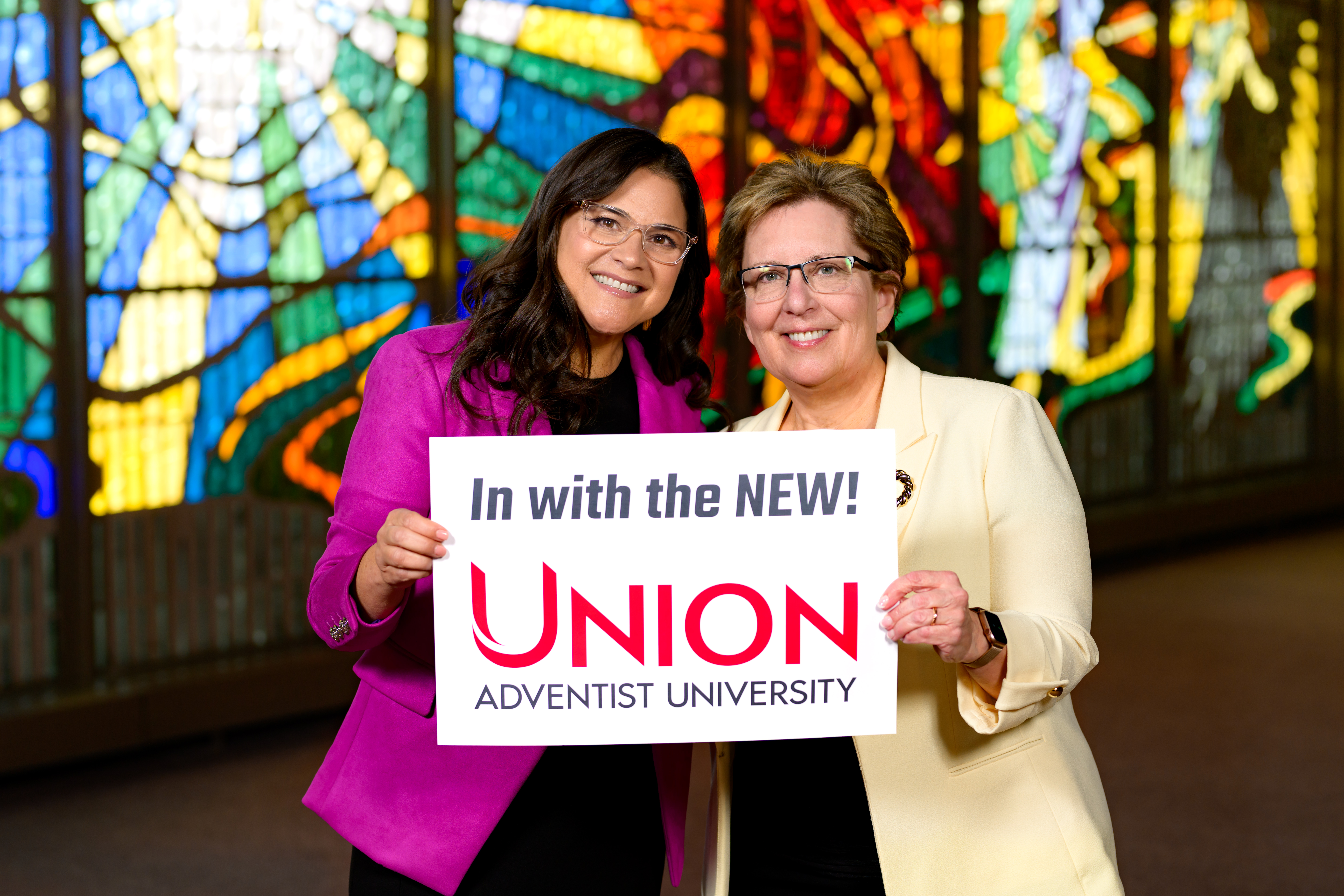 In With the New!
Gary Thurber – May 5, 2024
In With the New!
Gary Thurber – May 5, 2024
It is not very often you have an opportunity to work with someone who checks pretty much all the boxes in terms of their work ethic and love for the Lord. For 10 years I have had the opportunity to work with Dr. Vinita Sauder as president of Union College in Lincoln, Nebraska. She has a brilliant mind, incredible work ethic, is a visionary, is gracious and kind, and above all, loves the Lord and the Seventh-day Adventist Church. She has led us through some of the most difficult years for our school, as it has had to deal with Covid 19 and a demographic which shows fewer young people are out there to attend higher education. But despite all this, she has led our school with excellence and a heart of gold. As a result of her leadership, we have a new fitness center for our students, several new graduate programs, and a new name as of May 5, 2024—Union Adventist University—just to share a few highlights. We have been unbelievably blessed to have her as our college president. As she has chosen to retire, we needed to begin a new search last year for a new leader for our school. As we began our search, many, many people prayed throughout the whole process of selecting our next leader for Union Adventist University. We prayed for someone who foremost loves the Lord and is excited to be a part of the Adventist Church and its mission. We needed someone who had experience with higher education, who could articulate the beauty of and need for Adventist education, and someone who loved our young people and wanted to help them know our Savior and prepare them for a life of service. We believe the Lord has answered our prayers as our search led us to Dr. Yami Bazan, who is currently the associate dean for the school of medicine at Loma Linda University in California. Dr. Bazan comes to us with a rich background of working with young adults in a church setting, as a conference youth director, and in two separate higher education settings as well. She is known as someone who is a visionary and works well even in difficult situations. I ask that we all pray for Dr. Sauder as she begins a new chapter in her life and Dr. Bazan as she will soon be with us as the next president of Union Adventist University. Gary Thurber is president of the Mid-America Union Conference headquartered in Lincoln, Nebraska, and chair of the Union College/Union Adventist University Board of Trustees.
Read more... Connecting Virtually And In Person
Guest Contributor – April 30, 2024
Connecting Virtually And In Person
Guest Contributor – April 30, 2024
Cell phones have revolutionized the way we connect with those around the world. The introduction of cell phones opened the doors to instant communication. We can make a video call to Mom and Dad from miles away or text someone who is on a different continent. Cell phones have made us a digital society, and we do almost everything with our phones. With the passage of time, however, we have come to realize that by connecting digitally new challenges were created regarding how we understand one another. Before the existence of phones, we connected with people face-to-face. We met up with friends, family, co-workers or significant others to catch up with them. When we connect face-to-face, we can analyze facial expressions, tone of voice and posture. These things are essential to know if the person we are talking to is paying attention and is interested in what we are saying. Connecting digitally took away the visual aspect of seeing how the person we spoke to reacted —unless we made a video call, but it still isn’t the same. Liberty University, one of the largest private universities in the US, states that “Online interactions as convenient, advanced, and as helpful as they have been during this time, have also sometimes left us feeling more drained than energized.” If we go back to 2020 when we were in quarantine, we can remember the Zoom calls we made. Whether it was to attend school, work or see family members we all agreed that a video call wasn’t the same as being in that specific place in person. There were moments when we weren’t mentally present in that Zoom call. It was easy to open other tabs on the computer and play games, read an article, or do other work on the side. When I came to Union College, I remember how excited I was to be on campus and that I would be attending in-person classes. I was tired of Zoom calls and being home all day. I realized how important it was to me to be outside and see other people. Attending gatherings began to look exciting after being told that I could only stay home. I appreciate that we live in a world where technology has advanced to help us connect from wherever we are, but I can say that an online class isn’t the same as an in-person class. When I am in a classroom I get to interact with my classmates and do group projects. We can laugh and argue about topics that are talked about in class. Attending school in person allows us to create memories that we can look back on years down the road. Mental health has also been impacted now that we connect digitally more often. Psychiatrist Alan Teo observes that “[People] who regularly met in person with family and friends were less likely to report symptoms of depression.” When we stop connecting with people face-to-face, we become more attached to a digital connection. We could be afraid to meet new people and may wonder how to talk to them. Some of us may question how important social connections are to us. Dr. Stephen Braren, a researcher in developmental psychology, states that “Loneliness is a vital warning signal that tells us that our basic need for social connection is not met.” We may feel lonely when we move away from our family, or we travel to a new area to go to school or work. This leads us to attend events that happen around us such as small groups or gatherings. If we haven’t made connections yet we search for places that will create those connections for us. Maybe we don’t want to physically participate in an event, so we turn to digital communities. Facebook offers communities that are about a well-known individual, hobbies such as art or photography, or a variety of careers. We can join these groups and relate to others because of a common interest. Being part of a virtual society isn’t a bad thing. Through cell phones we have many different avenues to connect with people in some way. I am not saying we should get rid of our cell phones and forget about phone and video calls or text messaging. Yet we must take time to reflect on how much time we spend on our cell phones and the way we connect with those online. We should always remember the importance of having face-to-face connections as well. Through whatever channels, we are meant to connect with others and to have meaningful relationships. How to have a great in-person conversation Starting a meaningful conversation with someone you don’t know well can feel daunting, but with a few simple tips, you can foster genuine connections and meaningful interactions. Begin with a friendly greeting and a warm smile to create a welcoming atmosphere. Introduce yourself and repeat your name and their name. Give a compliment about what they’re wearing or an achievement they had if there are any you know about. Listen attentively and show interest in the conversation you are having. Ask open-ended questions about their family, work, hobbies or other things. Katie Tahay-Martinez is a senior at Union Adventist University in Lincoln, Nebraska. She is majoring in Language Arts Secondary Education to teach high school students.
Read more...

